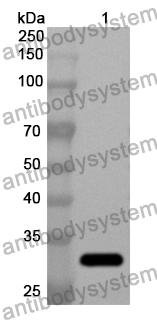Catalog No.
PHJ97501
Species reactivity
Human
Host species
Rabbit
Isotype
IgG
Clonality
Polyclonal
Immunogen
E. coli - derived recombinant Human EXO1 (Met1-Ile250).
Tested applications
ELISA: 1:4000-1:8000, IHC: 1:50-1:100, WB: 1:1000-1:4000
Target
hExo1, Exonuclease 1, Exonuclease I, hExoI, EXOI, HEX1, EXO1
Concentration
0.65 mg/ml
Purification
Purified by antigen affinity column.
Accession
Q9UQ84
Applications
ELISA, IHC, WB
Form
Liquid
Storage buffer
0.01M PBS, pH 7.4, 50% Glycerol, 0.05% Proclin 300.
Stability and Storage
Use a manual defrost freezer and avoid repeated freeze thaw cycles. Store at 2 to 8°C for frequent use. Store at -20 to -80°C for twelve months from the date of receipt.
MTHFR act as a potential cancer biomarker in immune checkpoints blockades, heterogeneity, tumor microenvironment and immune infiltration., PMID:37354330
Role of EXO1 nuclease activity in genome maintenance, the immune response and tumor suppression in Exo1D173A mice., PMID:35849338
A Human MSH6 Germline Variant Associated With Systemic Lupus Erythematosus Induces Lupus-like Disease in Mice., PMID:35708944
HMCES protects immunoglobulin genes specifically from deletions during somatic hypermutation., PMID:35450882
Multiple DSB Resection Activities Redundantly Promote Alternative End Joining-Mediated Class Switch Recombination., PMID:34926456
Specificity of end resection pathways for double-strand break regions containing ribonucleotides and base lesions., PMID:32555206
Pharmacogenetic analyses of 2183 patients with advanced colorectal cancer; potential role for common dihydropyrimidine dehydrogenase variants in toxicity to chemotherapy., PMID:30114658
Cell Killing Mechanisms and Impact on Gene Expression by Gemcitabine and 212Pb-Trastuzumab Treatment in a Disseminated i.p. Tumor Model., PMID:27467592
Poly(ADP-Ribose) Mediates the BRCA2-Dependent Early DNA Damage Response., PMID:26489468
Impact of α-targeted radiation therapy on gene expression in a pre-clinical model for disseminated peritoneal disease when combined with paclitaxel., PMID:25268703
Phosphorylation of EXO1 by CDKs 1 and 2 regulates DNA end resection and repair pathway choice., PMID:24705021
A peptide ELISA to detect antibodies against Pythium insidiosum based on predicted antigenic determinants of exo-1,3-beta-glucanase., PMID:24050102
Mechanism of DNA resection during intrachromosomal recombination and immunoglobulin class switching., PMID:23254285
Assessing somatic hypermutation in Ramos B cells after overexpression or knockdown of specific genes., PMID:22083360
Three-dimensionally specific inhibition of DNA repair-related genes by activated KRAS in colon crypt model., PMID:20454511
Bloom DNA helicase facilitates homologous recombination between diverged homologous sequences., PMID:19661064
Genetic evidence for single-strand lesions initiating Nbs1-dependent homologous recombination in diversification of Ig v in chicken B lymphocytes., PMID:19180185
ATR-dependent pathways control hEXO1 stability in response to stalled forks., PMID:18048416
Degradation of human exonuclease 1b upon DNA synthesis inhibition., PMID:15867354
Altered somatic hypermutation and reduced class-switch recombination in exonuclease 1-mutant mice., PMID:14716311
Competition between the Rad50 complex and the Ku heterodimer reveals a role for Exo1 in processing double-strand breaks but not telomeres., PMID:12861005
Identification of the human HEX1/hExo1 gene promoter and characterization of elements responsible for promoter activity., PMID:12531389
Expression specificity of the mouse exonuclease 1 (mExo1) gene., PMID:10497278
Characterization of antigenic epitopes in anti-ulcer pectic polysaccharides from Bupleurum falcatum L. using several carbohydrases., PMID:9825524
Cloning, characterization, and epitope expression of the major diagnostic antigen of Paracoccidioides brasiliensis., PMID:8626811
alpha GalNAc is essential for recognition of Exo-1 epithelial antigen by mouse monoclonal antibody Pa-G-14., PMID:7503962
Expression of epithelial antigens EPM-1 and EXO-1 in normal, transitional, inflammatory and neoplastic colorectal mucosa., PMID:8398302
Expression of differentiation antigens and growth-related genes in normal kidney, autosomal dominant polycystic kidney disease, and renal cell carcinoma., PMID:1739078
Expression of epithelial antigens Exo-1 and EPM-1 in human epidermal keratinocyte maturation and benign and malignant neoplasia., PMID:2253212
A similar protein portion for two exoglucanases secreted by Saccharomyces cerevisiae., PMID:2500920
Secretory epithelial cell marker on gastrointestinal tumors and in human secretions defined by a monoclonal antibody., PMID:3828998
Effect of tunicamycin on exo-1,3-beta-D-glucanase synthesis and secretion by cells and protoplasts of Saccharomyces cerevisiae., PMID:6820801

